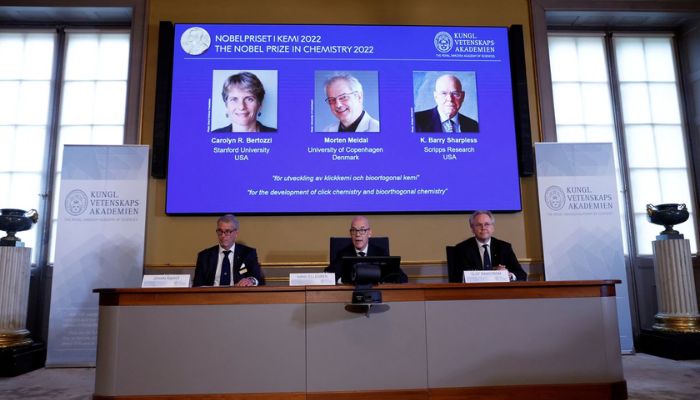
STOCKHOLM: Researchers Carolyn Bertozzi, Morten Meldal, and Barry Sharpless won the 2022 Nobel Prize in Science on Wednesday for finding responses that let atomic structure blocks snap together to make new wanted compounds productively.
The advancements known as snap science and bioorthogonal science are currently utilized universally to investigate cells and track organic cycles, the honor-giving body said in a proclamation.
"Utilizing bioorthogonal responses, analysts have worked on the focusing of malignant growth drugs, which are currently being tried in clinical preliminaries," it added.
The award was granted by the Imperial Swedish Foundation of Sciences and is worth 10 million Swedish crowns ($915,072).
The third of the awards uncovered more than six continuous non-weekend days, the science Nobel follows those for medication and physical science declared recently.
Sharpless joins an elite band of scientists who have won two Nobel prizes. The other individuals are John Bardeen who won the Physics prize twice, Marie Curie, who won Physics and Chemistry, Linus Pauling who won Chemistry and Peace and Frederick Sanger who won the Chemistry prize twice.
"I'm absolutely stunned, I'm sitting here and I can hardly breathe," Bertozzi said from California after the academy reached her by telephone with the news she had won.
The 2021 chemistry award was won by German Benjamin List and Scottish-born David MacMillan for their work in creating new tools to build molecules, aiding in the development of new drugs as well as in areas such as plastics.
The prizes for achievements in science, literature, and peace were established in the will of Swedish dynamite inventor and businessman Alfred Nobel, himself a chemist, and have been awarded since 1901. Economics was added later.
The prizes have been awarded yearly with a few interruptions, primarily for the world wars, and made no break for the COVID-19 pandemic. However, much of the pageantry and events were put on hold or temporarily moved online.



0 Comments